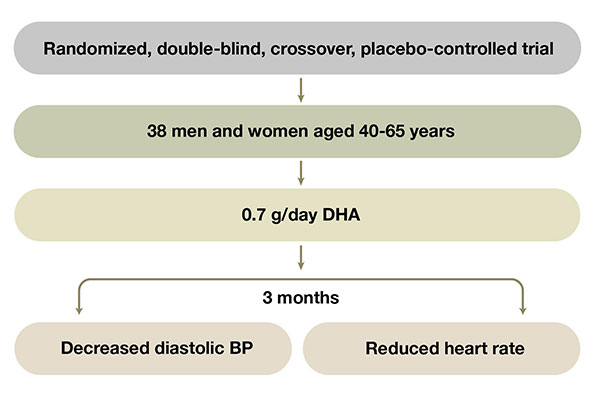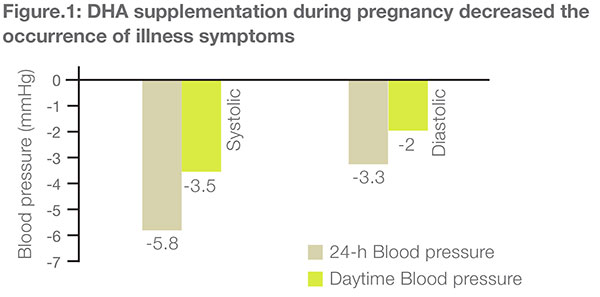The consumption of omega-3 fatty acids is associated with decreased risk of fatal myocardial infarction. However, the effect of the docosahexaenoic acid (DHA) on vascular function was unknown.
Therefore, this study was conducted to assess the efficacy of algal DHA on vascular function.

In conclusion the authors of the study revealed that the moderate increase in the daily intake of DHA is associated with lowering of diastolic BP, however, short term DHA supplementation did not show any positive association in endothelial function or arterial stiffness.
Theobald HE, Goodall AH, Sattar N, et al. Low-dose docosahexaenoic acid lowers diastolic blood pressure in middle-aged men and women. J Nutr. 2007;137(4):973-978.
Earlier animal studies have reported that the 2 major omega-3 fatty acids, eicosapentaenoic acid (EPA) and docosahexaenoic acid (DHA), might have differential effects on blood pressure BP and heart rate (HR).
This particular study was conducted to assess the differences in the effects of EPA or DHA on ambulatory (BP) and HR in humans.

57 men and women, 21-80 years of age, with fasting HDL levels of ≤ 44 mg/dl (in men) and ≤ 54 mg/dl (in women).
A double-blind, placebo-controlled parallel design trial
6 weeks
4 g/day of DHA, EPA or placebo respectively
DHA is the principal omega-3 fatty acid and is associated with significant reductions in ambulatory blood pressure and heart rate. Thus, these results indicate the important implications of DHA for human nutrition and the food industry.
Maki KC, et al. Lipid responses to a dietary docosahexaenoic acid supplement in men and women with below average levels of high density lipoprotein cholesterol. J Am Coll Nutr. 2005; 24(3):189-199.
The aim of the study was to assess fasting lipid responses to DHA supplement in men and women with below-average levels of high-density lipoprotein (HDL) cholesterol.
A randomized, double-blind, controlled clinical trial.
57 men and women with fasting HDL levels of ≤ 44 mg/dl (in men) and ≤ 54 mg/dl (in women) were enrolled into the study.
The subjects were randomized to receive 1.52 g/day DHA from DHA rich algal triglycerides or olive oil as a control respectively.
The study was carried out for a period of 6 weeks.
DHA supplementation significantly reduces trigly- ceride level and triglyceride/HDL cholesterol ratio
In patients with below-average HDL cholesterol concentrations, supplementation with DHA raised the LDL cholesterol level but showed favorable effects on triglycerides, the triglyceride/HDL cholesterol ratio and the fraction of LDL cholesterol carried by small, dense particles.
Maki KC, Van Elswyk ME, McCarthy D, et al. Lipid responses to a dietary docosahexaenoic acid supplement in men and women with below average levels of high-density lipoprotein cholesterol. J Am Coll Nutr. 2005;24(3):189-199.
The primary objective of this systemic review was to assess the effects of DHA and EPA on mortality and arrhythmias and to explore dose response and formulation effects.
32779 patients from total of 12 randomized, controlled trials were enrolled into the review.
Death due to cardiac causes was evaluated in 11 studies involving 32519 patients and showed a significant 20% decrease in events
The supplementation with DHA/EPA was associated with a significant reduction in deaths from cardiac causes however, had no effect on arrhythmias or all-cause mortality.
Leon H, Shibata MC, Sivakumaran S, et al. Effect of fish oil on arrhythmias and mortality: systematic review. BMJ. 2008;337:a2931. Published online 2008 December 23.
Several studies found that the consumption and blood levels of omega-3 fatty acids are inversely associated with the risk for sudden cardiac death. However, their relationship with all-cause mortality was unclear.
The aim of the study was to assess the association between baseline blood omega-3 FA levels and reduced risk for all-cause mortality in patients with stable coronary heart disease (CHD).
The Heart and Soul study is a prospective cohort design study with a median follow-up of 5.9 years.
A total of 956 patients were enrolled into the study.
In patients with stable CHD, higher baseline blood levels of DHA+EPA were associated with increased survival time
The significant blood levels of blood omega-3 FA levels were inversely associated with total mortality and were independent of standard and emerging risk factors in outpatients with stable CHD. Thus these results suggested that the decreased tissue omega-3 FA levels might adversely impact metabolism.
Pottala JV, Garg S, Cohen BE, et al. Blood EPA and DHA Independently Predict All-Cause Mortality in Patients with Stable Coronary Heart Disease. The Heart and Soul Study. Circ Cardiovasc Qual Outcomes. 2010;3(4):406–412.